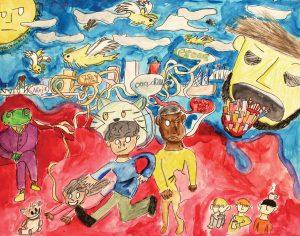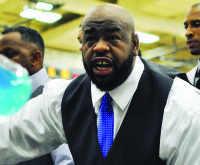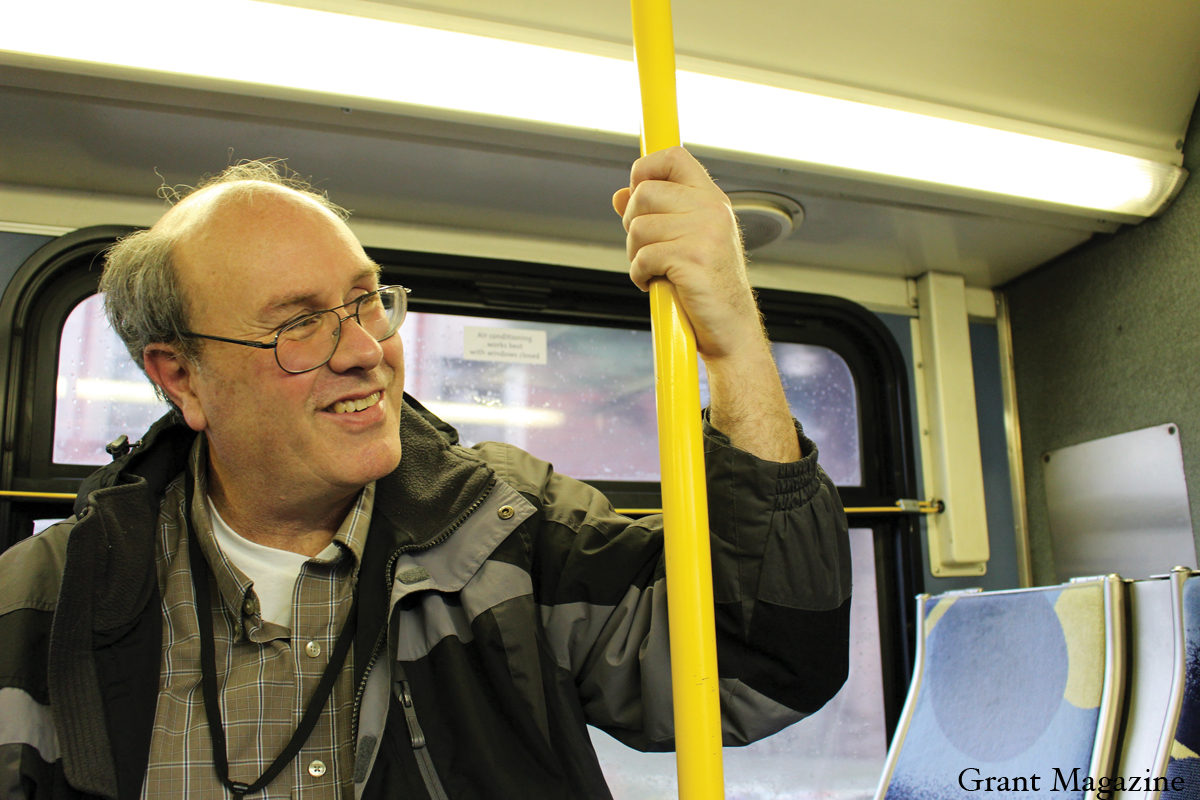Stephen Wiens remembers sitting in his freshman English class feeling confused.
A near straight-A student in middle school, life had always been easy for him in the classroom. But high school was another story. New ideas were more difficult for him to grasp. Notes were more difficult to organize. Words were more difficult to understand.
It was common knowledge that high school would be harder than middle school but Wiens felt he was doing everything possible to keep up. He was studying, finishing his homework and listening in class. For school to seem as challenging as it did, he couldn’t understand why things weren’t clicking like they used to.
“Beginning high school was a whole new experience,” he says. “Needing to adjust to everything made it even harder. I had no idea what was going on and I thought it might be ADD.”
It wasn’t until the summer before his sophomore year that he learned why school had been so difficult. He was diagnosed with dyslexia, a disorder that often distorts how words are read, heard or pronounced. No one expected it, especially Wiens.
The news shook his world upside-down. He slipped into academic probation and temporarily lost his spot on Grant’s track team. In order to recover, Wiens had to relearn the English language with the help of a tutor.
At the same time, his world was coming apart. He was devastated by his parents’ divorce, and his grandfather had passed away. With his whole life crumbling around him, Wiens found solace in art. Comics, pencil sketches, watercolors. It really didn’t matter. When he was creating things, he felt at peace.
“My sophomore year I felt burdened,” he recalls. “It was weird because I had all these bad feelings piling up. But through art, I knew that life goes on.”
Today, Wiens’ deep understanding of art, particularly comics (the medium he loves most), has helped him regain his academic footing. Through adoption, the divorce and the dyslexia, he continues to pursue the creative interest that sparks him.
“All I need is a paper, pencil, and my imagination, and I’m all good,” he says. “That’s when all my troubles go away.”
Wiens was born on Jan. 9, 1996, in New Orleans. His birth parents were in college and knew they couldn’t possibly support a child on a student income. After a series of phone calls, paper signings and contemplation, Wiens was adopted by his current parents, Scott Wiens and Joy Matthews. They were living in Burlington, Vermont at the time.
“Through art, I knew that life goes on.” – Stephen Wiens
His family lived in Vermont until he was four. He doesn’t remember much about it, except for the spacious backyard with a tree house in the corner and the snowballs he would often loft at his younger brother, Jacob, during the winter.
Jacob and their sister, Anna, were also born in New Orleans and adopted. None of them are biologically related.
Wiens remembers picking up Anna from New Orleans late at night. They met her biological father at a gas station and he handed her over to the Wiens family. Wiens was excited to usher a sister into the family but he also came to a new understanding about his own adoption. He realized his birth parents were people, they did not abandon him, and they wanted him to lead the best life he could even though they could not provide it.
Joy Matthews remembers when he was an infant. She had always wanted a child with dark brown eyes. She remembers a moment when baby Stephen opened his eyes and laughed. “I looked down at his dark brown eyes and I knew that he was the baby I always wanted,” says Matthews.
In 2000, after Matthews got a job in Portland, the family moved to a home in the Irvington neighborhood. At Irvington School, Wiens may have gotten his first glimpse of dyslexia in second grade. He showed signs of mild phonological difficulties, exhibiting trouble sounding out words. He also had a speech impediment.
These things seemed minor at the time and his parents barely worried about them. But they knew they needed to be addressed. He took special classes and played word games, even conquering the speech impediment.
He also discovered a passion for drawing comics. He often drew on his assignments and read comic books whenever he could. Calvin and Hobbes, Spiderman, Garfield, Tintin. You name it, Wiens read it.
He even created his own original character, “Bucktooth Man.” He was an adventurous superhero with superhuman strength and flying ability. With a rectangular body, a circular head, arms and legs, and a massive set of buckteeth, he was aesthetically nothing special.
But for Wiens, Bucktooth Man was everything. “Instead of coloring between the lines, Bucktooth Man represented me not drawing the same thing as everyone else anymore,” he says. “It opened up the floodgates.”
Matthews remembers going to the Oregon Coast when he was young. For the entire trip, Wiens drew Bucktooth Man in his sketchbook and dreamt up adventures that his imaginary superhero would take.
When the family walked down the beach, the sand became his medium. “He was running down the beach,” Matthews recalls, “drawing the face of Bucktooth Man in the sand as he went.”
At school, Wiens often filled blank books with his comics. His characters performed amazing feats of strength and kindness, but they were atypical superheroes. His protagonists were often himself and his siblings, walking through Portland, meeting flying cats and jazz frogs.
Matthews remembers a special camping trip Wiens took. The camp was organized by the Northwest Adoptive Families Association for families with adopted children to come together, play games and share experiences.
On the trip, Wiens and Jacob were throwing rocks into the lake with a girl around their age. When Matthews and Anna walked by, the girl figured out that the children were adopted and said: “I thought adoption was when your parents die or don’t want you.”
Matthews felt lost. She had no idea what to say to the girl’s comment. But there was no need. Wiens jumped right in. “That’s not it at all,” he explained. “My parents were both in college and were too busy to take care of me. They loved me but they knew they just couldn’t do it.”
“My grades were suffering because of dyslexia, and I was suffering because of it.” – Stephen Wiens
When Wiens turned 13, he received a box from his biological parents. His adoptive parents had been keeping it, waiting for his thirteenth birthday, as they had been instructed to do.
The box was filled with a collection of things assembled before he was born. His mother packed Mardi Gras beads, a scrapbook of pictures of what was happening when he was born, stories about his heritage and history books about important African-Americans.
His father, a drummer in a funk band, sent a lot of music, including his own. “My dad was much less transparent,” says Wiens. “He told me to listen to Prince, to listen to jazz and funk. He told me to learn how to play music.”
They sent the story of how they met in college, and the drama that accompanied it, down to the smallest detail. To this day, he still hasn’t met his birth parents.
By the time Wiens reached high school, he was academically primed to move forward. His grades throughout middle school were stellar. There was no question of his academic excellence until high school, when his grades started to falter.
During first semester of freshman year, his grade in math was dropping. But Wiens thought nothing of it. “I really just thought it was me not putting in the effort,” he recalls. “I knew that some people got better grades than others and that’s just the way it is.”
But during second semester, his English grade began to slip. At that point, his parents started to wonder. Wiens had never struggled in English. What was going on?
Over the summer, Wiens took multiple comprehension tests to see if he had a learning disorder. The family expected a diagnosis of attention deficit disorder. But at the end of the summer, Wiens’ parents were told their son had dyslexia.
“The dyslexia was surprising because it’s usually diagnosed so much earlier,” Matthews says. “As a parent, you feel bad because you feel like you should have seen it earlier.”
His parents sent Wiens to a tutor. “My parents kept me in the dark a little bit,” he says. “They wanted to see if the tutor thought something needed to be done, and then she told me.”
His tutor told him that getting diagnosed with dyslexia at such a late age was highly unusual. The disorder is usually exposed when children are learning to read. Wiens’ tutor told him that as a child he had mastered reading by memorizing whole words.
Instead of sounding out each syllable and sound, Wiens memorized words as entities, without taking the usual learning path and dissecting the sounds of the words. By doing this, he effectively sidestepped dyslexia at an early age.
When sophomore year began to get rigorous, Wiens’ dyslexia started hitting him harder. As he attempted to relearn the English language, new concepts and words began flying at him. His grades in chemistry and math started to sink lower than even he could have imagined.
Eventually, his grades dropped into the range of academic probation, and he was temporarily kept away from track and field. “My grades were suffering because of dyslexia, and I was suffering because of it,” he says.
Academic probation requires teachers to confirm that students are working hard to improve their grades. Wiens missed a total of two track meets. He overcame his dyslexia by meeting with a tutor twice a week in the library. With the tutor, they reviewed the sound of each letter, sounded out simple words, and ultimately dissected longer, more difficult words.
But Wiens didn’t complain and he didn’t talk about it to his friends. “I barely even knew he had it for a long time,” says Owen Corser, a senior. “He’s been really successful at recovering from it.”
That sophomore year was more difficult because of family issues. “I was diagnosed with dyslexia, my parents were getting divorced, and my grandfather died. That was the hardest year of my life,” he recalls.
Wiens clung to his art. “It was kind of an escape from reality,” he says. “When I was stressed, I would draw. It was a way of expressing myself.”
That year, Wiens noticed a change in his work. Usually chaotic and colorful, his art became “mellow.” His best example is a multi-shaded, blue abstract canvas painting. Unlike most other art he does, it’s calm, reserved and a little melancholy.
Once he had fully grasped the English language, Wiens’ grades began to improve, and he returned to the academic success he was used to. Though his sessions with a tutor were the most significant remedy, Wiens admits he would not have been able to do it without his art.
Friend Kenny Regan, a senior at Grant, thinks so too. “The fact that he has such a strong passion for it has helped him in everything he’s done. Having something that motivates you can help you with everything, and it definitely helped him,” Regan says.
Today, his dyslexia is pretty much a thing of the past. However, it’s not a completely conquered beast. Though it reappears infrequently, it still hinders his reading and speaking at times. “While reading, I automatically think to my tutor,” he says. “Sometimes, a word will be difficult for me to sound out, but I know how to approach it now.”
As for his comics, they have evolved tremendously since the creation of Bucktooth Man. He has taken it upon himself to try to have an impact on the reader. Studying comic strips and reading books about cartoon philosophies, Wiens began to take the next step toward being a professional cartoonist.
His AP art studio class requires him to have a portfolio that is graded by the College Board. His concentration is a noir comic strip, a medium generally characterized by long shadows and a 1920s setting.
Wiens has come far as an artist, but he still has a long way to go to reach his aspirations of being a professional. His drawings are somewhat chaotic and difficult to understand. They’re loaded with energy and color and rarely seem to calm down.
Melody Rockwell, his art teacher, says: “Stephen has the passion and the desire for it. He’s driven and there’s no shortage of ideas. His only challenge is to harness his energy. If he can do that, he has a lot of potential.”
His father, Scott Wiens, sees art in his future, though with a caveat. “If he can find a way to do his art and have a stable occupation at the same time, that’s what I hope for him,” he says.
Today, when Wiens sits in his seventh-period AP art class, his pencil glides over the paper seemingly without thought or hesitance. He knows the odds are stacked against him to be a professional comic artist. But he prefers not to let that get him down. “That’s the finish line,” he says. “However long it takes, even if I flunk out, that’s the goal.” ♦







































